基础写作训练 8 非谓语动词作状语只是分享
- 格式:doc
- 大小:23.50 KB
- 文档页数:3

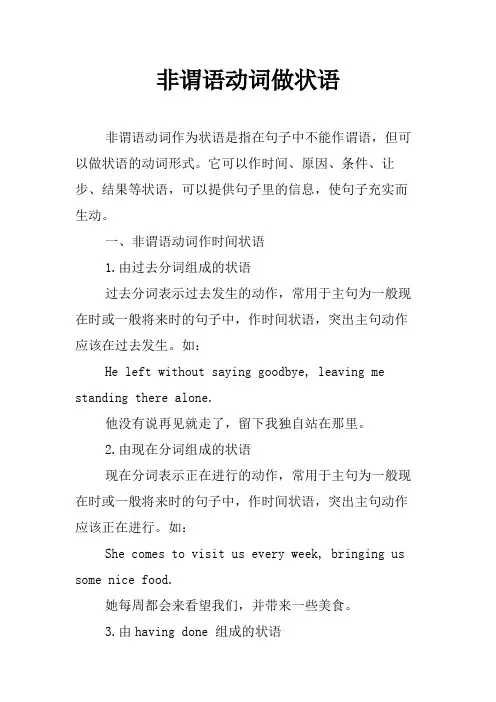
非谓语动词做状语非谓语动词作为状语是指在句子中不能作谓语,但可以做状语的动词形式。
它可以作时间、原因、条件、让步、结果等状语,可以提供句子里的信息,使句子充实而生动。
一、非谓语动词作时间状语1.由过去分词组成的状语过去分词表示过去发生的动作,常用于主句为一般现在时或一般将来时的句子中,作时间状语,突出主句动作应该在过去发生。
如:He left without saying goodbye, leaving me standing there alone.他没有说再见就走了,留下我独自站在那里。
2.由现在分词组成的状语现在分词表示正在进行的动作,常用于主句为一般现在时或一般将来时的句子中,作时间状语,突出主句动作应该正在进行。
如:She comes to visit us every week, bringing us some nice food.她每周都会来看望我们,并带来一些美食。
3.由having done 组成的状语having done 表示过去已经完成的动作,常用于主句为一般现在时或一般将来时的句子中,作时间状语,突出主句动作应该在过去完成的动作之后发生。
如:Having finished the exam, he went home and had a good rest.考试结束之后,他回家好好休息了。
二、非谓语动词作原因状语由because of,due to,owing to,thanks to等引导,接名词或动词不定式,作原因状语,表示主句动作的原因。
如:Because of the heavy rain, we had to cancel our picnic.由于下雨,我们不得不取消野餐了。
三、非谓语动词作条件状语由if,unless,in case,on condition that,provided (that),supposing (that)等引导,接动词不定式,作条件状语,表示“假设”的意思,表示主句动作的前提,即要想主句动作成立,必须满足什么条件。


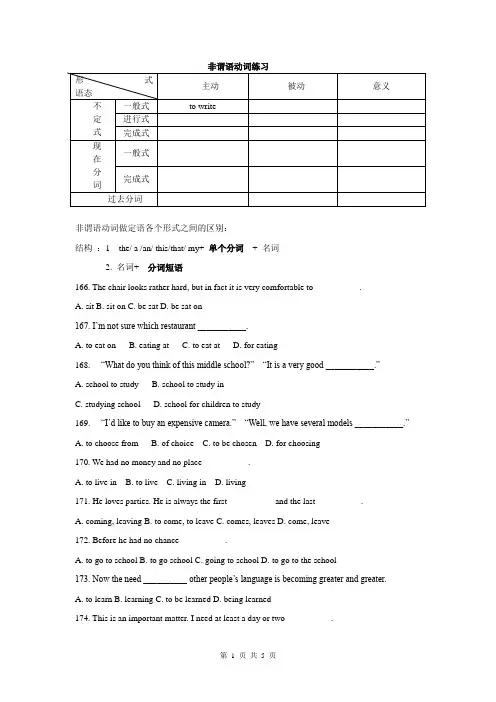
非谓语动词练习非谓语动词做定语各个形式之间的区别:结构:1 the/ a /an/ this/that/ my+ 单个分词+ 名词2. 名词+ 分词短语166. The chair looks rather hard, but in fact it is very comfortable to __________.A. sitB. sit onC. be satD. be sat on167. I’m not sure which restaurant ___________.A. to eat onB. eating atC. to eat atD. for eating168. ---“What do you think of this middle school?”---“It is a very good ___________.”A. school to studyB. school to study inC. studying schoolD. school for children to study169. ---“I’d like to buy an expensive camera.”---“Well, we have several models ___________.”A. to choose fromB. of choiceC. to be chosenD. for choosing170. We had no money and no place __________.A. to live inB. to liveC. living inD. living171. He loves parties. He is always the first __________ and the last __________.A. coming, leavingB. to come, to leaveC. comes, leavesD. come, leave172. Before he had no chance __________.A. to go to schoolB. to go schoolC. going to schoolD. to go to the school173. Now the need __________ other people’s language is becoming greater and greater.A. to learnB. learningC. to be learnedD. being learned174. This is an important matter. I need at least a day or two __________.A. of thinking over itB. to think it overC. of thinking it overD. to think over it175. It is time __________ wheat.A. for sowB. of sowingC. to sowD. to sowing176. “Do you have any clothes __________ today?” the maid asked.A. to washB. to be washedC. washD. be washed177. This is the best play __________ last year.A. to performB. to be performedC. performingD. to have performed178. This book can be used in __________ countries.A. English-speakingB. English-spokenC. English-spokeD. English-speak179. At present, English is the main subject ___________ here.A. to be taughtB. being taughtC. teachingD. to be teaching180. Snow was falling when they went along a mountain path __________ to the front.A. to leadB. ledC. leadingD. being led181. ---“Who are those people with the banner?”---“A group ______ itself the League for peace.”A. callingB. callsC. calledD. is called182. “The picture writing” __________ long long ago is hard for us to understand today.A. having been drawnB. being drawnC. was drawnD. drawn183. How I regret the days __________ in doing the useless work!A. which wastedB. having been wastedC. which wastingD. having wasted184. The students, _____ at the way the questions were put, didn’t know the answers to them. A. they surprising B. surprised C. their being surprised D. surprise185. The pen __________ belongs to me.A. which it is on the tableB. lying on the tableC. is on the tableD. which on the table非谓语动词做状语的区别:186. This dish cloth is __________ for me to dry the dishes.A. so wetB. wet enoughC. as wetD. too wet187. The house is much too small __________.A. for us to liveB. for us to live inC. that we can’t liveD. that we can’t live in188. The light was strong enough __________.A. read byB. to read byC. read underD. to read189. H didn’t speak slowly enough __________.A. every one understoodB. for everyone understoodC. for everyone to understandD. for everyone to be understood190. Would you be __________ to show me the way to the City Hall?A. good enoughB. good enough asC. so goodD. as good as191. He was so foolish __________ his car unlocked.A. to leaveB. that leaveC. as to leaveD. for him to leave192. Napoleon spoke so loudly as to __________ in front of his soldiers.A. hearB. be heardC. listenD. be listened193. Do you think him easy __________.A. to get along withB. to get alongC. to be got along withD. to be got along194. The water is good __________.A. to drink itB. to be drunkC. to drinkD. at drinking195. His speech in English was difficult __________ .A. in followingB. for being followedC. to followD. to be followed by196. Good-bye, M r Jones. I’m pleased __________.A. for meeting youB. to meet youC. to have been meeting youD. to have met you 197. I have enjoyed my visit here. I’ll be very sorry __________.A. for leavingB. of leavingC. to leaveD. left198. I spoke to him kindly _________ him.A. to not frightenB. so as not to frightenC. in order to not frightenD. for not frightening199. Tom is waiting __________ the doctor.A. to seeB. for to seeC. for seeingD. for see200. I went to see him __________ him out.A. findingB. findC. only to findD. only found201. _________, one needs much practice.A. To learn swimming wellB. To learn to swim wellC. Swimming to be learned wellD. Learning swim well202. __________, I don’t like her sister.A. Telling the truthB. Been told the truthC. To tell the truthD. To tell the true 203. __________ for several weeks, the city was short of food and clothing. A. As having flooded B. As flooding C. Having been flooded D. to flood 204. __________ tomorrow’s lessons, I have no time to g o out with you.A. Not preparingB. Not prepareC. Not being preparedD. Not having prepared 205. _________ from the tallest building, the whole city looks very beautiful..A. SeeB. SawC. SeeingD. Seen206. Look around when ___________ the street.A. acrossB. crossingC. crossedD. to be crossing207. We walked as fast as we could, __________ to catch the 9:30 train.A. hopingB. to hopeC. we hopedD. being hoped208. ___________ the past, our life is much better.A. Comparing withB. Be compared withC. To compare withD. Compared with 209. __________ the cry for help, people immediately rushed out of the rooms.A. To hearB. HearingC. Having heardD. They hearing210. It __________ heavily, the outing had to be put off.A. being rainedB. being rainingC. rainingD. rains211. The sun __________, they went home.A. set downB. settedC. settingD. sets212. __________ the concert began.A. The listeners having taken their seatsB. Having taken their seatsC. Have taken their placesD. The listeners to have taken their places213. __________ Hello, he reached out his hand.A. SaidB. SayingC. Talked aboutD. Talking to214. He rushed into the room, __________.A. with sweat drippingB. sweat drippedC. dripped sweatD. sweated215. __________, I went out for a walk.A. There was nothing to doB. There being nothing to doC. There had nothing to doD. There were nothing to do答案:166-170 BCBAB 171-175 BAABC 176-180 BBABC 181-185 ADBBB答案:186-190 DBBCA 191-195 CBACC 196-200 DCBAC201-205 BCCDD 206-210 BADBC 211-215 CABAB。



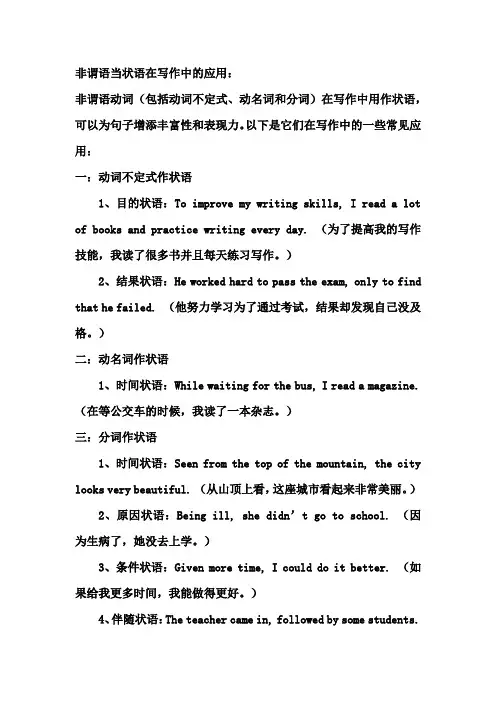
非谓语当状语在写作中的应用:非谓语动词(包括动词不定式、动名词和分词)在写作中用作状语,可以为句子增添丰富性和表现力。
以下是它们在写作中的一些常见应用:一:动词不定式作状语1、目的状语:To improve my writing skills, I read a lot of books and practice writing every day. (为了提高我的写作技能,我读了很多书并且每天练习写作。
)2、结果状语:He worked hard to pass the exam, only to find that he failed. (他努力学习为了通过考试,结果却发现自己没及格。
)二:动名词作状语1、时间状语:While waiting for the bus, I read a magazine. (在等公交车的时候,我读了一本杂志。
)三:分词作状语1、时间状语:Seen from the top of the mountain, the city looks very beautiful. (从山顶上看,这座城市看起来非常美丽。
)2、原因状语:Being ill, she didn’t go to school. (因为生病了,她没去上学。
)3、条件状语:Given more time, I could do it better. (如果给我更多时间,我能做得更好。
)4、伴随状语:The teacher came in, followed by some students.(老师进来了,后面跟着一些学生。
)在实际写作中,合理运用非谓语动词作状语可以丰富句子的层次和内涵。
比如:1、“Surrounded by beautiful mountains and clear rivers, the village looks like a fairyland.”被美丽的山川和清澈的河流环绕,这个村庄看起来像仙境。
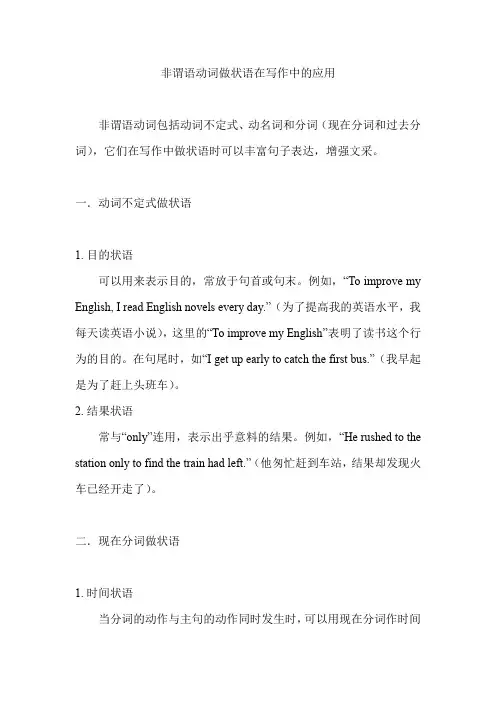
非谓语动词做状语在写作中的应用非谓语动词包括动词不定式、动名词和分词(现在分词和过去分词),它们在写作中做状语时可以丰富句子表达,增强文采。
一.动词不定式做状语1.目的状语可以用来表示目的,常放于句首或句末。
例如,“To improve my English, I read English novels every day.”(为了提高我的英语水平,我每天读英语小说),这里的“To improve my English”表明了读书这个行为的目的。
在句尾时,如“I get up early to catch the first bus.”(我早起是为了赶上头班车)。
2.结果状语常与“only”连用,表示出乎意料的结果。
例如,“He rushed to the station only to find the train had left.”(他匆忙赶到车站,结果却发现火车已经开走了)。
二.现在分词做状语1.时间状语当分词的动作与主句的动作同时发生时,可以用现在分词作时间状语。
例如,“Walking in the park, I met an old friend.”(在公园里散步的时候,我遇到了一位老朋友),“Walking in the park”这个动作和“met an old friend”同时发生。
2.原因状语表原因,相当于一个原因状语从句。
如“Being ill, he didn't go to school.”(因为生病了,他没去上学),这里“Being ill”是他没去上学的原因。
3.伴随状语表示伴随状况,与主句的动作同时进行。
比如,“The girl sat there, reading a book.”(女孩坐在那儿,读着一本书),“reading a book”伴随“sat”这个动作。
过去分词做状语1.时间状语和现在分词类似,当过去分词表示的动作先于主句动作时,可作时间状语。
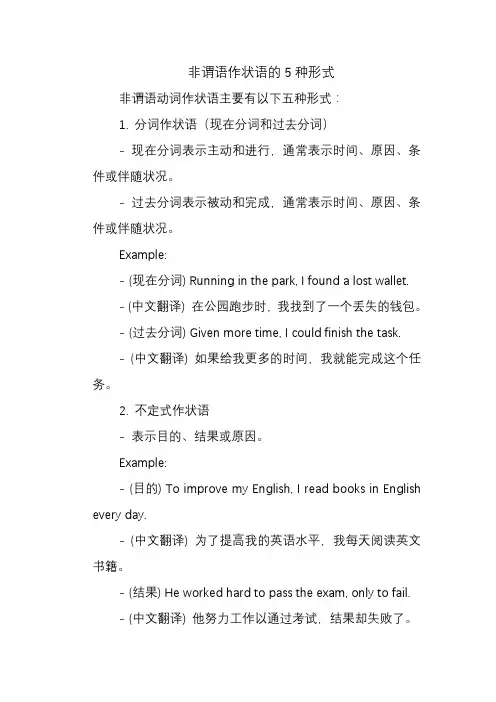
非谓语作状语的5种形式非谓语动词作状语主要有以下五种形式:1. 分词作状语(现在分词和过去分词)- 现在分词表示主动和进行,通常表示时间、原因、条件或伴随状况。
- 过去分词表示被动和完成,通常表示时间、原因、条件或伴随状况。
Example:- (现在分词) Running in the park, I found a lost wallet.- (中文翻译) 在公园跑步时,我找到了一个丢失的钱包。
- (过去分词) Given more time, I could finish the task.- (中文翻译) 如果给我更多的时间,我就能完成这个任务。
2. 不定式作状语- 表示目的、结果或原因。
Example:- (目的) To improve my English, I read books in English every day.- (中文翻译) 为了提高我的英语水平,我每天阅读英文书籍。
- (结果) He worked hard to pass the exam, only to fail.- (中文翻译) 他努力工作以通过考试,结果却失败了。
- (原因) To see her smile is to understand her happiness.- (中文翻译) 看到她的微笑就能理解她的幸福。
3. 句子作状语- 通常是一个完整的句子,用来修饰主句,表示原因、条件、时间等。
Example:- (原因) Because it was raining, we canceled the trip.- (中文翻译) 因为下雨,我们取消了旅行。
- (条件) If it rains, we will stay at home.- (中文翻译) 如果下雨,我们就待在家里。
- (时间) When the bell rings, the class will start.- (中文翻译) 当铃声响起时,课程就开始了。
分考点1 不定式作状语Point 1 做目的状语,意为“为了”,可以单独放在句首、句中或句末。
To pass the college entrance exam, we must work hard.为了通过大学入学考试,我们必须努力学习。
Mike had to shout to make himself heard above the sound of the music.麦克不得不大声说话,以便能在如此大的音乐下被别人听见。
【特别注意】也可用in order to 或so as to 表示目的,但so as to 不能用于句首。
The bus stopped so as to pick up passengers.公交车停下来以便搭载乘客。
He got up early in order to catch the first bus.他早起是为了赶上第一版公交车。
Point 2 作结果状语。
常表示令人意外的结果。
Only/just to do 表示意想不到的结果Enough to do 足够做...Too...to do 太...而不能.....So/such... as to...如此...以至于....I went to see him last night only/ just to find him out.我昨晚去找他。
结果发现他出去了。
(表示出乎意料的结果)Mary is too tired to do the job.玛丽太累了,做不了这项工作。
He is old enough to go to school.他到上学的年龄了。
Point 3 作原因状语。
常用在表示情感或态度的sorry, surprised, disappointed, excited, glad,happy 等形容词后,常用结构为“主语+系动词+形容词+to do”。
Tom was very happy to see his mother.汤姆看到她的妈妈很高兴。
基础写作训练8 非谓语动词作状语
●熟悉句型
非谓语动词包括动词不定式、动名词和分词三种。
非谓语动词的使用会使结构简洁明朗,信息量大,是英语作文中最大的亮点。
因此,正确使用非谓语动词是高考作文获得高分的一个法宝。
不定式做状语可表示目的、结果或原因,而分词做状语可表时间、原因、结果、条件、让步,行为方式、伴随状况等。
为了强调,还可以与while,when,once,if,unless等连词连用。
1.Finding the course very difficult, she decided to move to a lower level.
_________________________________________________________
2.I stopped the car to take a rest as I was feeling tired.
_________________________________________________________
ed with care, one tin will last for six weeks.
_________________________________________________________
4.The machine is very easy to operate.
●学以致用
I.使用非谓语动词改写下列句子。
1.People usually shake hands when they are introduced to each other.
_________________________________________________________
2.Because the boy was greatly to uched by his teacher’s words, he did a lot of things to help
his classmates.
_________________________________________________________
3.Even if I’m invited, I won’t take part in the party.
_________________________________________________________
4.The teacher entered the classroom, and he was followed by a group of students.
_________________________________________________________
5.Because I didn’t know how to get in touch with him, I turned to his brother.
_________________________________________________________
6.Since I haven’t met him before, I don’t know what he is like.
_________________________________________________________
7.His parents were very poor, and couldn’t afford to send him to school.
_________________________________________________________
8.The worker wrote to the police and disclosed who stole the money.
_________________________________________________________
II.根据以上改写内容进行一对一再练习。
1.当受到他人的表扬时,你应该保持谦虚。
_________________________________________________________
2.美丽的风景激发了他的灵感,他创作出了又一伟大作品。
_________________________________________________________
3.即使受到老师的表扬,他也不显得高兴。
_________________________________________________________
4.他在他的儿子的陪同下去了火车站。
_________________________________________________________
5.由于对这个城市很了解,我感到就像在家一样。
_________________________________________________________
6.由于好久没有他的音讯了,我感到很焦虑。
_________________________________________________________
7.他太小了,还不能上学。
_________________________________________________________
9.我给他打电话,邀请他参加我的生日派对。
_________________________________________________________
III.完成句子(每空一词)
1.
2.
3.
5.同学们,请注意!下面广播通知。
Boys and girls, attention please! I have an announcement______ _______.
6.
7.
8.
9.有位叫张玉林的英语教授要到我校作“如何学习英语惯用法”的演讲;时间是6月
10日,星期二,下午2时30分,地点是第三大教室。
希望同学们准时出席。
Mr. Zhang Yulin, a professor of English, will come ______ _______ us a lecture______ “How to
learn English Idioms” ______2:30, ______ Tuesday afternoon, June 10. The lecture______ _______ ______ _______ in the Lecture Room 3. Please be there on time.
10.
11.
12.
14.晚会将在主楼屋顶花园举行。
晚上7点开始。
将举办各种活动,如跳舞、唱歌、游
戏和礼物交换。
The evening party______ _______ ______in the roof garden of the Main Building. It______ _______at 7:30p.m.. Various activities will be held, ______ _______ dancing, singing, games and exchange of gifts.
16.
17.
18.原意参加者请于周四前到一楼服务台报名。
Those______ want to go should______ _______ for it at the Service Desk______ the first floor ______ Thursday.。